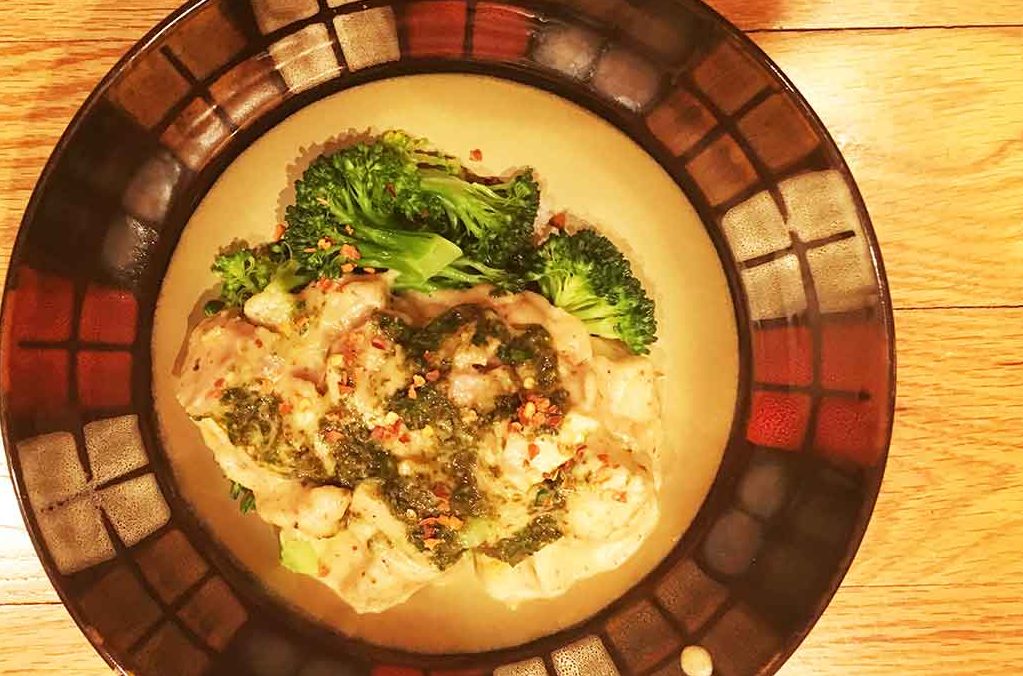Creamy Chicken and Broccoli

A creamy sauce makes this dish seem slightly decadent, but using low-fat ingredients and serving it over a bed of steamed broccoli provides a healthful alternative to pasta.
Who doesn’t like a creamy cheesy sauce over just about anything? Many of us shun the indulgence to avoid excess fat and calories. This recipe provides a lighter version of a classic sauce and makes it even healthier if you serve it over vegetables instead of noodles or rice.
YOU MIGHT ALSO LIKE: Pumpkin Apple Spice Soup
Ingredients
- ½ pound boneless, skinless chicken breasts
- ½ pound cleaned and trimmed broccoli cut into bite-sized pieces
- 1 tbsp. butter
- 1 tbsp. plus 1 tsp. olive oil
- ¼ cup finely chopped onion
- 2 tbsp. flour
- 2 tbsp. grainy mustard
- 2 cups lowfat (1 percent) milk
- 1 cup grated white cheddar
- ½ tsp. dried tarragon
- ½ tsp. dried oregano
- ½ tsp. dried basil
- ¼ tsp. salt plus more to taste
- ¼ tsp. freshly ground pepper plus more to taste
Directions
Chicken
Cooking the chicken separately keeps it moist. You can also do this step ahead of time or use leftovers.
Preheat your oven to 350 degrees. In a small bowl or ramekin, mix together the last five ingredients, crushing the spices with your fingers to mix. Place the chicken breasts in a baking dish and coat with 1 tsp. of olive oil. Sprinkle the spice mixture over the chicken and bake for 15 to 20 minutes until the dish is just barely done.
Broccoli
While the chicken is baking, wash and chop the broccoli and place it in a microwaveable glass bowl. Cover the bowl with a plate and microwave until the broccoli is tender but still crisp, about 5 minutes. (Never microwave in plastic or use plastic wrap to cover food you are microwaving. The heat can cause some plastics to break down and leach into your food. As an alternative, you can steam the broccoli, but microwaving preserves more of the nutrients.)
Divide between two bowls.
When the chicken is just barely cooked through, remove it from your oven and allow it to rest. When the chicken is cool enough to handle, cut it into bite-sized pieces and set aside.
Sauce
Start with a basic béchamel sauce and build in your flavor.
Add the butter and olive oil to a large skillet over medium-high heat. (Butter has fewer calories and more flavor than olive oil, but combining the two minimizes saturated fat. You can also make the recipe with all butter or all oil.)
When the butter is melted and bubbling, add the chopped onion. Sautee until translucent, 3 to 4 minutes.
Add flour and a pinch of salt. Cook, stirring frequently, until the mixture turns golden brown. It will be clumpy. Whisking constantly, slowly add the milk and allow the sauce to come to a boil. The clumps will dissolve, and the sauce will thicken. If it’s too thick, add more milk; too thin, more flour.
Whisk in mustard. Whisk in grated cheddar. When the cheese is just melted, add the chicken until it’s warmed through and coated in sauce. Taste and adjust seasonings. Pour over broccoli and enjoy.
Serves two.
Tip
For added flavor, top the dish with a little fresh pesto (store bought will also work) and hot pepper flakes.
Basic pesto
To the bowl of a small food processor, add:
- 1 large garlic clove
- 2 cups of fresh basil leaves (packed, washed, and stems removed)
- 1/3 cup walnuts
- ½ cup grated parmesan
Pulse the mixture until all ingredients are chopped and mixed. With the blade running, slowly drizzle in 1/3 to ½ cup of good quality olive oil, until the mixture is the desired consistency. Pesto is traditionally made with pine nuts, which are delicious if you want to splurge (but they’re expensive).
Each serving (without pesto) contains approximately:
- 590 calories
- 19 g fat
- 124 mg cholesterol
- 742 mg sodium
- 30 g carbohydrate
This dish is high in protein (47 g, 94 percent DV), vitamin A (25 percent DV), vitamin C (138 percent DV), and calcium (35 percent DV).
*Percentage of daily values (DV) based on a 2,000-calorie diet. Your daily values may be higher or lower depending on your calorie needs.
Updated:
October 31, 2023
Reviewed By:
Janet O'Dell, RN